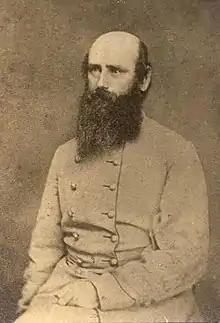Richard Thomas Walker Duke
Richard Thomas Walker Duke Sr. (June 6, 1822 – July 2, 1898) was a nineteenth-century congressman and lawyer from Virginia.
Richard T. W. Duke | |
|---|---|
 | |
| Member of the Virginia House of Delegates from Albemarle County | |
| In office 1880 – 1881 Alongside T.L. Michie | |
| Member of the U.S. House of Representatives from Virginia's 5th district | |
| In office November 8, 1870 – March 3, 1873 | |
| Preceded by | Robert Ridgway |
| Succeeded by | Alexander Davis |
| Personal details | |
| Born | June 6, 1822 Charlottesville, Virginia |
| Died | July 2, 1898 (aged 76) "Sunny Side," Charlottesville, Virginia |
| Resting place | Maplewood Cemetery, Charlottesville, Virginia |
| Political party | Conservative |
| Other political affiliations | Funder (in 1880s) |
| Profession | lawyer |
| Military service | |
| Allegiance | |
| Branch/service | |
| Rank | |
| Unit | |
| Battles/wars | American Civil War |
Early and family life
Born near Charlottesville, Virginia, he was the son of Francis Edward Duke (November 29, 1783 in Berkeley, Virginia - November 8, 1836 in Harpers Ferry, West Virginia), the Speaker of the Virginia House of Delegates and Elizabeth Morris Kendrick (August 23, 1802 in Lancaster, Pennsylvania - October 6, 1869 in Richmond, Virginia). Duke attended private schools as a child and graduated from the Virginia Military Institute in 1844 and from the law department of the University of Virginia in 1850.
Career
Following his admission to the Virginia bar, Duke ran for election as the commonwealth attorney for Albemarle County, Virginia. Elected in 1858, he served as until 1869.
In November, 1859, Duke organized the Albemarle Rifles at Charlottesville. At the outbreak of the Civil War, Duke and his company were mustered into service as Company B of the 19th Virginia Infantry. Duke served with the regiment till he was not re-elected during the reorganization of the regiment and dropped in April, 1862.
Duke continued fighting for the Confederacy, as he was elected Colonel of the 46th Regiment, Virginia Infantry in May, 1862. He remained commander till he resigned in March, 1864, due to quarrels with his commander, General Henry Wise. In May, 1864, Duke became Lieutenant Colonel and commander of the 1st Virginia Reserves Battalion. Duke served in the defenses of Richmond and later the Appomattox Campaign and was later captured with his command at the Battle of Sailor's Creek.
After being released from prison in July, 1865, Duke returned to Charlottesville and resumed his law practice. He was elected a Conservative to the United States House of Representatives to fill a vacancy in 1870, defeating Alexander Rives, who ran as a Republican, who courteously and without his normal charge secured a pardon for his opponent in order to remove any taint of civil disability. Rives subsequently was appointed and confirmed as U.S. District Judge for the Western District of Virginia. Congressman Duke served until 1873. Voters elected him to the Virginia House of Delegates in 1879 and 1880.
Death and legacy
Duke died at his estate called "Sunny Side" near Charlottesville, Virginia on July 2, 1898 and was interred in Maplewood Cemetery in Charlottesville.
Electoral history
1870 - Duke was elected to the U.S. House of Representatives unopposed in a special election and was concurrently elected in the general election unopposed.
External links
- United States Congress. "Richard Thomas Walker Duke (id: D000521)". Biographical Directory of the United States Congress. Retrieved on 2008-10-18
- "Richard Thomas Walker Duke". Find a Grave. Retrieved 2008-10-18.
- Richard Thomas Walker Duke at the Albemarle Charlottesville Historical Society
- A Genealogy of the Duke-Shepherd-Van Metre Family (page 271)
- The Duke Family Papers
| U.S. House of Representatives | ||
|---|---|---|
| Preceded by Robert Ridgway |
Member of the U.S. House of Representatives from Virginia's 5th congressional district 1870–1873 |
Succeeded by Alexander Davis |
